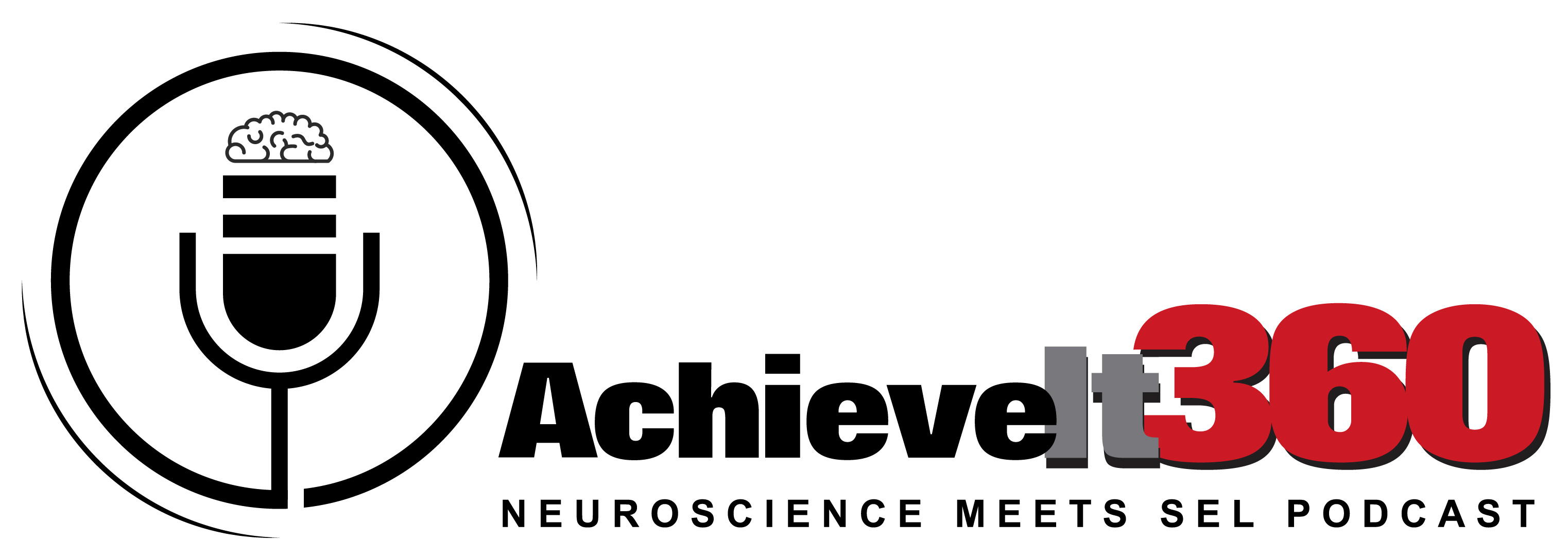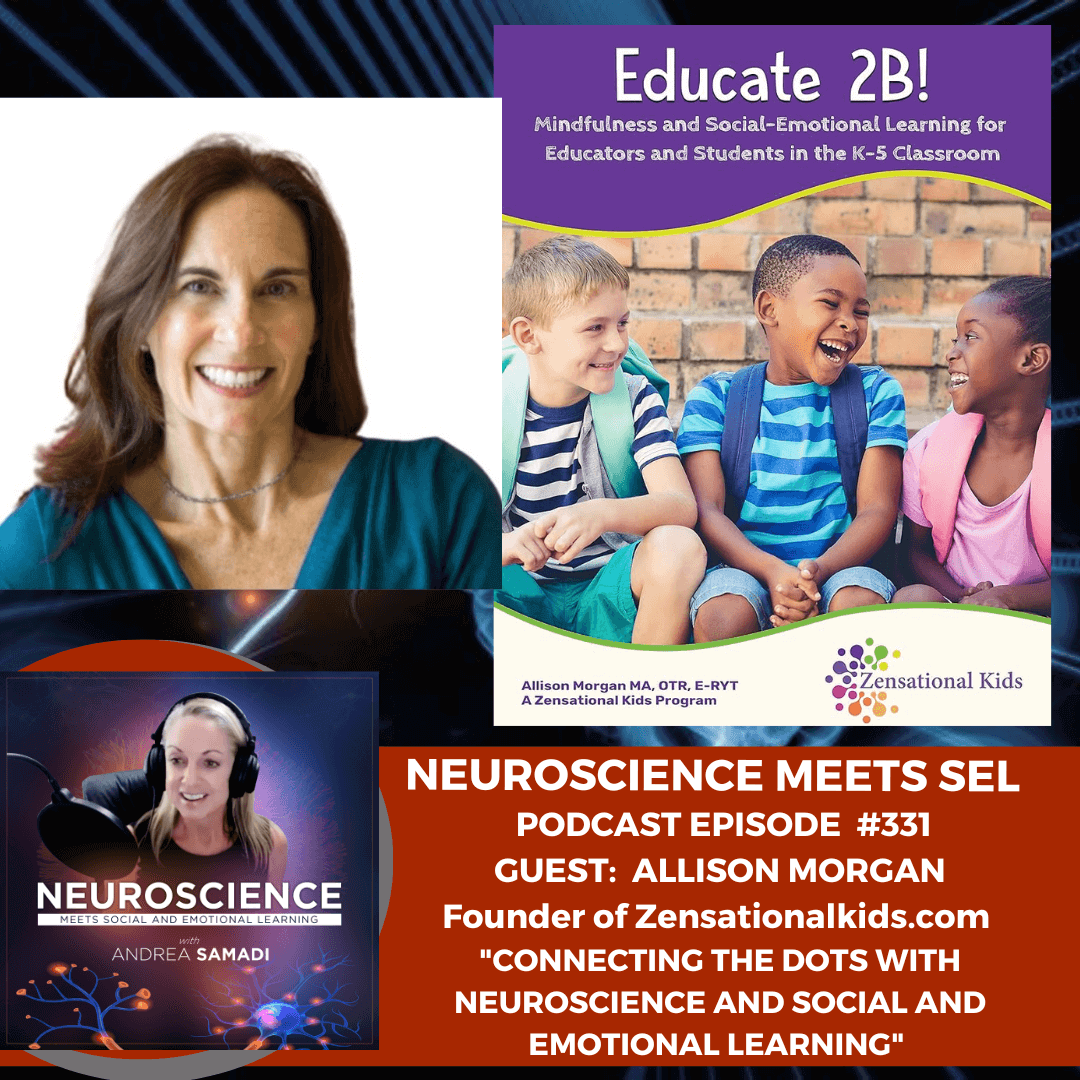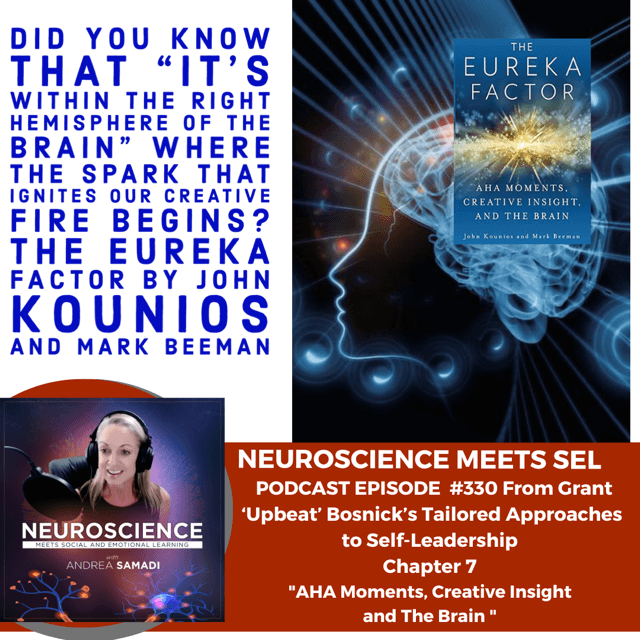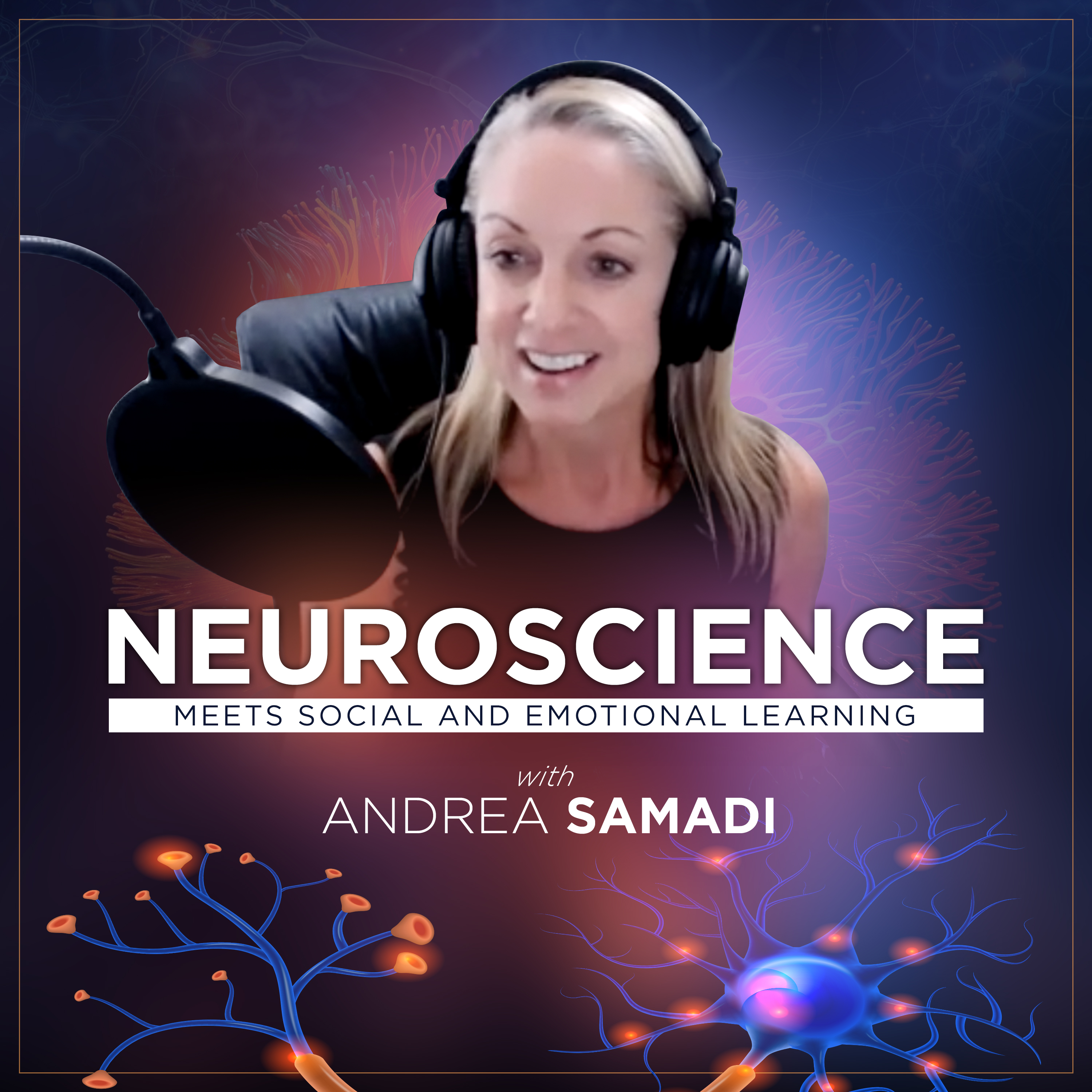Welcome back to the Neuroscience Meets Social and Emotional Learning podcast, episode #83. This is PART 2 of our last episode on “How Looking at Your Brain Can Change Your Life” with a deeper dive into what we learned from getting a SPECT Image Brain Scan at Dr. Amen’s Clinic in Costa Mesa, CA.
For those who are new here, my name is Andrea Samadi, I’m a former educator who created this podcast to bring awareness, ideas and strategies to our most pressing issues facing educators in the workplace, or parents working from home or in the corporate space, to keep us all working at our highest levels of productivity. The goal is to bring the most current brain research and practical neuroscience, connected to our social and emotional skills, to take our results to the next level.
Last episode we did a case study of my friend Doug Sutton, whose whole life changed when he made the decision to get a SPECT image brain scan from Dr. Amen’s Clinics. While Doug was having some noticeable issues with his health, like brain fog and his energy levels, I made the decision to get the scan just to improve and optimize what we are already doing, as well as to see if there is anything they notice that we should be aware of now. When I was interviewing Dr. Shane Creado, episode 72 on “Sleep Strategies that Will Guarantee a Competitive Advantage” I wanted to know specific strategies that I could use to optimize my performance and results, and he suggested “why don’t you just go and get your brain scanned. This way, we can look at the results, and see exactly what type of brain you have, and he could make more targeted suggestions from there. Stay tuned for PART 3 of this Brain Scan Series where I will share my results, after I have had the chance to speak with Dr. Creado later next week.
This is where the process began for my husband and me. Since I had posted about the fact we were going, I have received so many messages from friends asking “What did you learn? Why exactly did you go? How much did it cost? What was the test like? Does the test reveal a snapshot of your brain as it is today, or in general?” All of these are great questions, and the reason I figured I would break up the experience into parts.
If you have considered getting a brain scan, and you are either like Doug, you’ve been noticing some symptoms (brain fog, maybe memory problems, low energy) and you want to look at the organ that controls pretty much everything that you do, and everything that you are, then this podcast episode series is for you. Or maybe you are like me, you don’t have any symptoms, but you just want to get an accurate snapshot of what is happening in your brain, so you can optimize your results, and at least know what’s going on with the most important organ in your body.
So, here’s what I would recommend you do if you are thinking about it. Start with doing as much research as you can about Dr. Amen,[i] Amen Clinics[ii] and The Brain Warrior’s Way Podcast that he and his wife host, to hear from the many guests he interviews, showcasing different ways to put your brain health first.[iii] Dr. Amen, one of the most famous psychiatrists in the country, found that looking at the brain could tell you a lot about someone when treating them. Adding SPECT Imaging Brain Scans to psychiatry, took his practice to the next level. On his website, you will find all of the locations he has offices (east coast, west coast, and central locations like their Chicago office where Dr. Creado works out of). There’s a lot of free resources you can access, as you learn more about what issues you might be facing, thinking of solutions that he recommends. Once you have trust in his work, the decision to call and learn more about moving ahead with a brain scan is much easier. He has a wonderful overview of the process on how to read the scans called “Brain SPECT Imaging Made Ridiculously Simple”[iv] on his blog. In this overview you will learn:
- Why Dr. Amen started doing SPECT brain imaging in the first place.What a SPECT Scan (Single, Photon, Emission, Computed Tomography) looks like.What a healthy brain looks like (full, even, symmetrical activity) from even blood flow.
(AMEN CLINICS photo of a healthy brain-even blood flow)
- What an unhealthy brain looks like, spotting signs of Alzheimer’s Disease ahead of time, so you can work on optimizing the brain.
Alzheimer’s can be seen in the brain years before symptoms occur. Both sides of the brain are affected with decreases in the Parietal Lobe (top back part of your brain) and Temporal Lobes.
- What drugs or alcohol do to the brain? They damage the brain.
Photo of a healthy brain, next to an addict’s brain.
- What even a mild traumatic brain injury can do to the brain.
- How SPECT scans show evidence of trauma, toxins like mold or chemotherapy, or infections like Lyme disease. My friend Doug Sutton spoke about mold exposure that gave him brain fog, and he also mentioned that BulletProof Radio Dave Asprey also had mold exposure, and it was Dr. Amen who inspired him to create his BulletProof line of products.How SPECT scans can help people with mental health disorders and addictions.
This drug education poster hangs in 100,000 schools. It’s a more realistic image of what drugs do to your brain than the image that I remember growing up of an egg cracking into a pan to represent a brain on drugs. It just doesn’t have the same impact as this poster does, or real brains that were damaged by drugs/alcohol use.
- What the scan tells us? Good activity, (blood flow) Too little activity, Too much activity. Then Dr. Amen and his team can balance the brain with supplements, and strategies.The difference between a surface view of the brain, and active view (inside) the brain.
If you want to see a more humorous overview of the SPECT scan, actress and comedian Laura Clery covers her SPECT scan from start to finish.[v] I’m usually a pretty serious person, especially when it comes to getting my brain scanned, so this overview of a very serious topic, was hilarious to watch. Actress Laura Clery was having some problems with her memory and wanted to look and see if there was anything they would find out with this scan. She admits that she is a former drug user and hoping that the damage she did in her early years is reversible, which we have heard Dr. Amen say when he says “You’re not stuck with the brain you have.” It is possible to improve brain structure and function. She walks you through the experience from start to finish, not missing a detail, of finding the clinic, to the IV injection of Saratech that maps out your brain, to the test where you have to click the space bar when you see a letter, and not click the bar when you see an “x” which was more difficult than it sounds, (my husband said this test drove him crazy and it looks like Laura had a similar experience). She also takes you through the actual brain scan where she was told to lay still, but she moved, and had to do the entire scan over again.
The Brain Scan Process
It’s interesting that everyone asks the brain scan technician “what did you see” after the scan, and he/she will tell you “wait until you speak with the doctor.” Once your scan is complete, you will have the opportunity to discuss the results with a doctor. I chose Dr. Creado from the Chicago offices to do my evaluation, since he was the one who recommended I take the test in the first place, so I won’t be able to record PART 3 of this episode with the results until the end of next week.
Brain Scan Predictions Based on My Understanding of the Brain
I do have some predictions of what I think we will see, based on studying Dr. Amen’s work for the past year, and applying what I am learning to my own life. You can do the same, especially if you take his Thrive by 25 Online[vi] course. It will be interesting to see if my predictions are correct, but this is what I think we are going to see.
With my brain scan, I think that I have what he considers a busy brain, or hyper frontality where we can be over focused. He suggests that a way to improve this would be to prevent serotonin from going too low, or I will have problems, which I kind of figured out on my own over the years. He suggests to naturally increase serotonin through exercise, high protein foods and supplements. I already know that without exercise, I just don’t work well, because I need this boost in serotonin to work at my best. I also eat a high protein/higher fat diet which also works well for me. He also suggests taking supplements to calm the busy brain like 5 HTP or saffron, and I have been doing this for the past year.
For my husband’s brain scan, I think that he will show hypofrontality, or low frontal lobe activity, which is the opposite of mine. He talks all the time about having a shorter attention span, and wonders if he has ADHD. He did have a mild traumatic brain injury years ago, and he works best with scheduled exercise and a higher protein diet. It will be interesting to see if these predictions are correct after our evaluations.
Until then, if this episode has made you think about your own brain, take some time to go to www.amenclinics.com and call the number on their website to learn more about how you could begin your pathway to a better brain and life. Spend some time doing some research, watch the video series listed in the show notes on Spect Imaging Made Simple and Tune into the Brain Warrior’s Way Podcast to dive deeper into learning new strategies to improve your brain and life, or take the Thrive by 25 online course and see if you can make connections between your brain, and behavior. We can always improve our brain, which will in turn improve our life, it’s just up to us to do this.
See you next week with the results of my brain scan.
RESOURCES:
Neuroscience Meets SEL Podcast Episode #72 on “Sleep Strategies that will Guarantee a Competitive Advantage.” with Dr. Shane Creado https://andreasamadi.podbean.com/e/dr-shane-creado-on-sleep-strategies-that-will-guarantee-a-competitive-advantage/
REFERENCES:
[i] Dr. Daniel Amen and Tana Amen and The Brain Warrior’s Way Podcast
[ii] Amen Clinics www.amenclinics.com
[iii] The Brain Warrior’s Way Podcast https://brainwarriorswaypodcast.com/
[iv] Brain Spect Imaging Made Simple by Dr. Daniel Amen https://www.amenclinics.com/blog/brain-spect-made-ridiculously-simple-part-1/
[v] Actress Laura Clery’s SPECT Scan Experience https://www.facebook.com/watch/?v=755883174955398
[vi] Thrive by 25 Online Course by Dr. Daniel Amen https://brainmd.com/brain-thrive-by-25
Podcast: Play in new window | Download
Subscribe: Apple Podcasts | RSS












